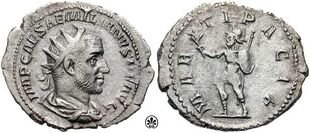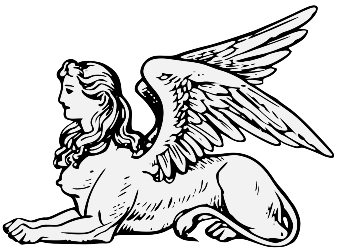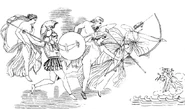
The Roman deity Mars pictured, at right, on the coin of Roman Emperor Aemilianus, in AD 253.
Mars was the Roman God of War, the son of Juno and Jupiter. As the word Mars has no Indo-European derivation, it is most likely the Latinized form of the agricultural Etruscan god Maris. Initially, the Roman god of fertility and vegetation and a protector of cattle, fields and boundaries, Mars later became associated with battle and identified with the Greek god Ares. He was also a tutelary god of Rome, and as the legendary father of its founder, Romulus, it was believed that all Romans were descended of Mars.
One of his most recognizable epithets is Mars Ultor, which translates in Latin to "Mars the Avenger".
The Roman senator Tacticus compared Mars to the Anglo-Saxon god, Tiw.
Worship[]
Mars, unlike his Greek counterpart, Ares the god of war, was more widely worshipped than any of the other Roman gods, probably in part because his sons by the Vestal Virgin Rhea Silvia, Romulus and Remus, were said to have founded Rome; the Romans called themselves the sons of Mars. Venus, who was Mars' consort in legends borrowed from the Greek mythos, held a similar importance for them because of her relationship to Aeneas. Mars was also one of the three supreme Roman deities of the Archaic Triad, along with Jupiter and Quirinus.
In his agricultural aspect, Mars presided over springtime and crops in major festivals. In his warlike aspect, Mars was offered sacrifices before combat and was said to appear on the battlefield accompanied by Bellona, a warrior goddess variously identified as his wife, sister, daughter or cousin. Mars' wife was also said to be Nerio.
Mars had a succession of festivals in the months of February, March and October, as well as one on June 1. On March 1, the Feriae Marti (loosely "Festivals of Mars") was celebrated. On February 27 and March 14, the horserace of the Equirria were held. On March 23, the Tubilustrium was celebrated by purifying weapons and war-trumpets. On October 19, the Armilustrium was celebrated in Mars' honor, and the weapons of the soldiers were purified and stored. Every five years, the Suovetaurilia was celebrated, consisting of the sacrifice of a pig, sheep and bull—Mars was one of only three Roman deities, along with Neptune and Apollo, to whom bulls could be sacrificed.

Painting of Venus and Mars by Sandro Botticelli, 1483.
The Campus Martius ("Field of Mars") was dedicated to Mars, and was where soldiers and athletes trained. Mars also had an altar there, the Ara Martis. In the Regia on the Roman Forum, the hastae Martiae ("lances of Mars") were kept in a small chamber. Any movement of the hastae Martiae was seen as an omen of war. If Rome was attacking, the generals moved their lances and repeated Mars vigila ("Awaken, Mars!").
Priests of Mars and Quirinus were called Salii ("jumpers"). They were referred to as jumpers because they jumped down streets and sang the Carmen Saliare. A lone priest of Mars was called a flamen Martialis.
Mars was sometimes associated with Quirinus, a Sabine deity said to be the Spirit of Romulus, the founder of Rome. He was also identified with Celtic gods of war, particularly in Roman Britain, and was commonly considered not only a war-bringer, but also a peaceful protector, healer and tribal god, to the Celts.
Mars' symbols are the wolf, woodpecker, bear, spear, and armour.
Influence[]
The Mars symbol originally represented the deity Mars. It is now associated with the Male gender, mainly because Mars was considered the god of Masculinity.
The name of the third month of the year, March, is derived from Mars via the Roman month Martius, which was considered a lucky time to go to war.
The blood-red fourth planet in the Solar System, Mars, was also named after Mars; an adjective form of Mars, Martian (from Martianus), is most commonly used in reference to the planet. Another adjective form of Mars, Martial (from Martialis), is instead associated with war, as in martial law. Martial, along with another adjectival form, Martin (from Martinus), is a common name. A more popular name derived from Mars is Mark (Italian, Marco).
Powers and Abilities[]
Mars was a powerful Deity and a son of Jupiter, and only became more powerful during conflict or times of war.
- Immortality
- Agricultural Inuition
- Divine Weaponry (spear/sword/shield)
- Shield Proficiency
- Spear Proficiency
- Swordsmanship
- Fertility Manipulation (limited)
- Guardianship (of Rome)
- Life-Force Manipulation
- Plant Manipulation
- Plant Growth
- Sacrificial Power (usually the sacrifice of enemy's weapon)
- Supernatural Beauty
- Supernatural Body
- Supernatural Reflexes
- Supernatural Senses
- Supernatural Strength
- War Deity Physiology
- Combat & Peace Empowerment (war to secure peace)
- Combat Specialist
- Combat Perception
- Enhanced Combat
- Fearlessness
- One-Man Army
- War Manipulation
- Army Manipulation
- Battlefield Manipulation
- Combat Manipulation
- War Inducement
- War Manipulation
- Weapon Proficiency
- Spell Castings
- Shapeshiftings
- Flight
Gallery[]
See also[]
External links[]
| Roman mythology articles | |
|---|---|
| Deities | Apollō • Bacchus • Bellona • Bona Dea • Castor and Pollux • Ceres • Cupid • Diana • Dīs Pater • Egeria • Fauna • Faunus • Flora • Genius • Hercules • Janus • Juno • Jupiter • Lares • Liber • Libertas • Mars • Mercury • Minerva • Orcus • Neptune • Penates • Pluto • Pomona • Priapus • Proserpina • Quirinus • Saturn • Silvanus • Sol • Venus • Vesta • Vulcan |
| Heroes | Hercules |
| Groups | Demideities • Deities • Titans |
| Creatures | Faun • Sīrēnēs • Centaur |
| Titans | |
| Locations | Rome |
| Topics | Titanomachy |
| Gods and goddesses of Roman mythology | |
|---|---|
| Classical deities | Apollo • Bacchus/Liber • Diana • Ceres • Cupid • Faunus • Fortuna • Juno • Jupiter • Lares • Mars • Mercury • Minerva • Neptune • Pluto • Proserpina • Quirinus • Vejovis • Venus • Vesta • Vulcan |
| Other deities/articles | Genius • Hercules • Dei Lucrii • Eventus Bonus • Furina • Portunes • Mystery religions • Osirus • Isis • Cybele • Attis • Mithras • Sol Invictus |

